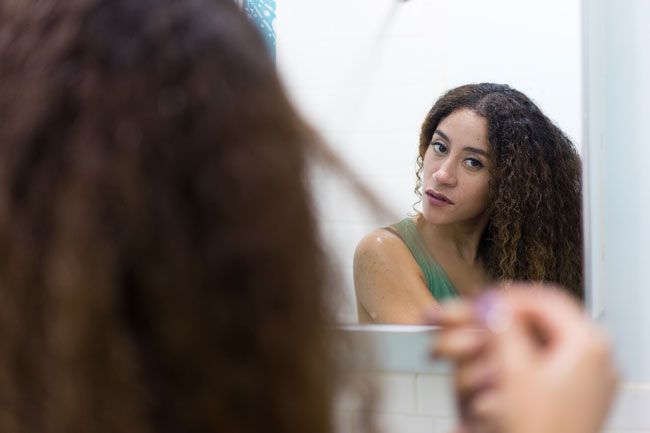
Co-washing is the practice of cleansing your hair with conditioner in place of a shampoo. Due to the popularity of the practice, product manufacturers began providing co-washes and cleansing conditioners as products to replace the traditional conditioner when co-washing.
Due to its gentle effect on natural hair, co-washing is the primary cleansing method for many naturals. However, sometimes co-washing can lead to unexpected and negative outcomes. Here are some signs that your cleansing conditioner or co-wash is not working properly–and how to address them.
3 major signs that your cleansing conditioner or co-wash is not working properly
1. After you co-wash, you see white residue on your scalp
This is a definitive indicator of product buildup. It also means that your co-wash or cleansing conditioner is not up to the challenge of removing the products that remain on your scalp. A stronger cleanser–and maybe even a clarifying shampoo–may actually be necessary in order to provide the thorough, deep clean your scalp requires.
It is a good idea to deeply cleanse your hair every few months (or weeks, depending on the type of stylers you use in your regimen”>. Even if you do not notice product buildup on your scalp, it is a good idea to give your strands a deep every so often.
2. Your hair feels drier throughout the day
This can be due to a lack of response to your usual moisturizing products and is likely an indicator of product buildup on your strands. Once your hair starts being affected by product buildup, it will become drier over time–additionally, more buildup reduces the amount of moisture that actually makes its way to your curls.
Pay careful attention to your hair and if your tried and true regimen starts to fail you, try a clarifying shampoo or apple cider vinegar rinse.
3. Your hair feels limp and spongy
Is it possible to over-moisturize the hair? Absolutely. This issue usually occurs to the veterans in the natural hair game, since we tend to focus on boosting moisture levels as one of the steps in promoting hair growth and can tip the scale when it comes to moisture-protein balance, which is essential to maintaining healthy hair. Typically this happens after we have been using too much protein and our hair starts feeling hard. In an attempt to recalibrate, we start avoiding protein upping our hair’s moisture intake to the point where it becomes overdone.
If your hair feels limp, spongy, and softer than what you have become accustomed to, it’s probably over-moisturized. If it keeps stretching and stretching without breakage, this is also an indicator that the protein-moisture balance is compromised and must be addressed.
Cut back on the frequency of your co-washing, especially if you do so several times a week. Introduce a mild protein treatment and go from there, based on your hair’s response.
It’s not a one-size-fits-all situation.
Over-moisturized hair does not occur the same way with each natural. What causes over moisturized hair in one individual won’t necessarily have the same impact on another. Lifestyle, environment, and other factors also play a part. As always, the key is to pay close attention to your hair. This way, you will notice early warning signs that products are not being effective or are causing unintended results.
Have you had issues with co-washing? Share yours below
Let the NC community know what works for you.
